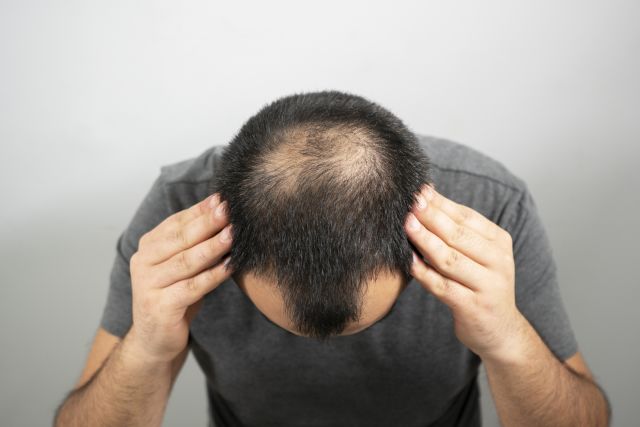Updated on September 30, 2024.
A pattern of a receding hairline and thinning crown hair as people get older is called male-pattern baldness. It’s more common in people who are assigned male at birth, but people assigned female at birth can develop it, too. Scientists are working to better understand the cause, but it’s likely related to both your environment and your genes.
Typically, strands of hair grow for two to six years, stop for a few months, then fall out. One key factor in male-pattern baldness is an androgen (hormone) called dihydrotestosterone (DHT), which along with testosterone is important to sexual development. In adults, though, DHT contributes to hair loss. Too much DHT activity around the hair follicles can make the follicles smaller and the hair growth cycle shorter, which can lead to hair loss.
There’s a lot of androgen activity and sensitivity in the balding scalp, and certain genetic variations in androgen receptors correlate with the tendency to go bald. That’s why male-pattern balding runs in families.
A pattern of premature balding does not necessarily translate to increased libido or sexual prowess, says urologist Steven Kaplan, MD, director of the Men’s Wellness Program at Mount Sinai Health System in New York City.
What can I do about male-pattern baldness?
If it doesn’t bother you, there's no reason to treat it. In fact, by age 50, more than half of men in the United States have at least some male-pattern baldness. On the other hand, if you do want to intervene, it can help to keep your expectations realistic. While there's no cure, there are treatments that can help.
Minoxidil (Rogaine) is an over-the-counter topical solution that comes in foam, liquid, and shampoo formulations. It’s applied directly to the scalp to stimulate the hair follicles. It’s recommended for people under age 40 who have recent hair loss.
For many people, minoxidil slows hair loss and stimulates hair to regrow. You need to use minoxidil for at least six to eight months before seeing results. When you stop using it, most of the new hair will fall out within a few months.
Finasteride (Propecia) is a prescription pill that slows down hair loss and can sometimes stimulate new hair growth. It can take a few months to see the effects and will have to be taken continually in order for it to keep working. In rare cases, finasteride can cause side effects, like a higher risk of prostate cancer and lowered sex drive and sexual function.
Other medication options are spironolactone (Carospir, Aldactone) and oral dutasteride (Avodart), which is used off-label for hair-loss. Its main use is to treat an enlarged prostate. Alternative remedies for hair loss include hairpieces, hair transplants, and low-level laser therapy. Plastic surgery procedures are another option, such as scalp reduction, where the bald scalp is removed and skin that still has hair is drawn together in its place.
It's easier to maintain hair growth than it is to regrow new hair, so if you think you may be bothered by hair loss as it progresses, treat your thinning hair sooner rather than later.







